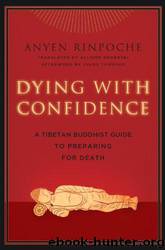Dying With Confidence: A Tibetan Buddhist Guide to Preparing for Death by Anyen Rinpoche

Author:Anyen Rinpoche
Language: eng
Format: azw3
Tags: Death, Social Science, Family & Relationships, Bereavement, General, Grief, Religion, Buddhism, Self-Help, Tibetan, Death & Dying
ISBN: 0861716566
Publisher: Wisdom Publications
Published: 2010-05-10T00:00:00+00:00
▶ The second metaphor depicts the consciousness as a traveler. The meaning of this metaphor is that our consciousness isn’t always going to be in the same body or in the same place. It moves around. In this case, it is going to move out of the present body.
▶ The third metaphor depicts the pure land, the “dwelling place” of enlightened beings, as the consciousness’ destination. We visualize it about an arrow’s length above our heads.
When we practice phowa based on the three metaphors, from the point of view of conventional reality, our ordinary way of thinking, we are sending the consciousness to a pure land, seen as our home or birthplace. From the point of view of ultimate reality, we are simply sending the consciousness into the unborn Dharmakaya. We can rely on either of these two views depending on our level of experience.
The great protector Maitreya said that when one realizes the state of equality, or the nature of mind, there are no lower realms or lower births. All is the expression of a pure land. We often think of the pure realms of realized beings as existing somewhere outside of us. It is important to realize that, in regards to a pure land, there is no place to go. The only pure realm is mastery of the mind.
Our own perception is dominated by impurity. We don’t need many reminders of how agitated our minds become by outer conditions; we are constantly upset by situations that we view impurely. Perhaps while we are walking we are approached by someone who is begging or someone that we don’t like, and we become disturbed and agitated. This has to do with our inner experience and the way that we perceive the world. Yet it is possible to purify the mind so that we see all as a pure land.
When we speak about a bodhisattva being realized, it means that he or she can see beyond duality, beyond attachment or dislike. A bodhisattva cannot be harmed by outer things. This is all the result of mastery over the mind. We can calmly bear the outer things that tend to hurt us; we have the ability to transform our suffering.
During the stages of appearance, increase, attainment, and full attainment, there are many opportunities for us to practice phowa for ourselves. When the white essence, or thigle, of the father moves from the head toward the heart, we “see” a vast sky permeated with the light of the moon. Here is our first opportunity to practice after the outer breath has ceased. This begins the three-fold stage during which the three poisons naturally cease. Anger dissolves during the stage of appearance, desire during the stage of increase, and ignorance during the stage of attainment. Examining this logically, it makes sense that the process of dying is described as the easiest time to attain liberation. In our normal experience, we are constantly afflicted by the three poisons, but here there is a very short period of time when the three poisons naturally cease.
Download
This site does not store any files on its server. We only index and link to content provided by other sites. Please contact the content providers to delete copyright contents if any and email us, we'll remove relevant links or contents immediately.
Nudge - Improving Decisions about Health, Wealth, and Happiness by Thaler Sunstein(7660)
iGen by Jean M. Twenge(5387)
The Fire Next Time by James Baldwin(5386)
Adulting by Kelly Williams Brown(4536)
The Sports Rules Book by Human Kinetics(4348)
The Hacking of the American Mind by Robert H. Lustig(4342)
The Ethical Slut by Janet W. Hardy(4215)
Captivate by Vanessa Van Edwards(3817)
Mummy Knew by Lisa James(3658)
In a Sunburned Country by Bill Bryson(3509)
The Worm at the Core by Sheldon Solomon(3456)
Ants Among Elephants by Sujatha Gidla(3442)
The 48 laws of power by Robert Greene & Joost Elffers(3149)
Suicide: A Study in Sociology by Emile Durkheim(2990)
The Slow Fix: Solve Problems, Work Smarter, and Live Better In a World Addicted to Speed by Carl Honore(2979)
The Tipping Point by Malcolm Gladwell(2873)
Humans of New York by Brandon Stanton(2848)
Handbook of Forensic Sociology and Psychology by Stephen J. Morewitz & Mark L. Goldstein(2679)
The Happy Hooker by Xaviera Hollander(2673)
